Lowering your energy bills during the summer can be achieved through a combination of energy-efficient practices, smart home adjustments, and mindful usage of appliances. Here are some tips to help you reduce your energy consumption and save on costs:
Cooling
- Use a Programmable Thermostat: Set your thermostat to a higher temperature when you’re not home and lower it when you are. A programmable thermostat can automate these changes for you.
- Ceiling Fans: Use ceiling fans to circulate air. They can make a room feel cooler without lowering the temperature.
- Maintain Your AC Unit: Regularly clean or replace air filters and ensure the unit is in good working condition. Dirty filters force the AC to work harder.
- Close Blinds and Curtains: Keep blinds and curtains closed during the day to block out heat from the sun.
- Use Natural Ventilation: Open windows and use exhaust fans to let cooler evening air in and hot air out.
Insulation and Sealing
- Seal Leaks: Check for and seal any leaks around doors, windows, and other openings to prevent cool air from escaping.
- Attic Insulation: Properly insulate your attic to keep the cool air in and hot air out.
Appliances
- Energy-Efficient Appliances: Use energy-efficient appliances. Look for ENERGY STAR-rated products.
- Limit Oven Use: Ovens generate a lot of heat. Use microwaves, stovetops, or outdoor grills instead.
- Unplug Devices: Unplug devices when not in use, as many consume energy even when turned off.
Lighting
- LED Bulbs: Replace incandescent bulbs with LED bulbs, which use less energy and generate less heat.
- Use Natural Light: Maximize the use of natural light during the day to reduce the need for artificial lighting.
Water Heating
- Lower Water Heater Temperature: Set your water heater to 120°F (49°C) to save energy.
- Use Cold Water for Laundry: Wash clothes in cold water when possible.
Outdoor
- Shade Trees: Plant shade trees or install awnings to reduce heat gain from the sun.
- Reflective Roof Coating: Consider a reflective roof coating to reduce heat absorption.
Behavioral Changes
- Shorter Showers: Take shorter showers to reduce the energy needed to heat the water.
- Efficient Dishwashing: Run your dishwasher only when it’s full and use the energy-saving setting if it has one.
- Smart Power Strips: Use smart power strips to easily turn off multiple devices at once.
Implementing these tips can help you lower your energy bills and contribute to a more energy-efficient home.

